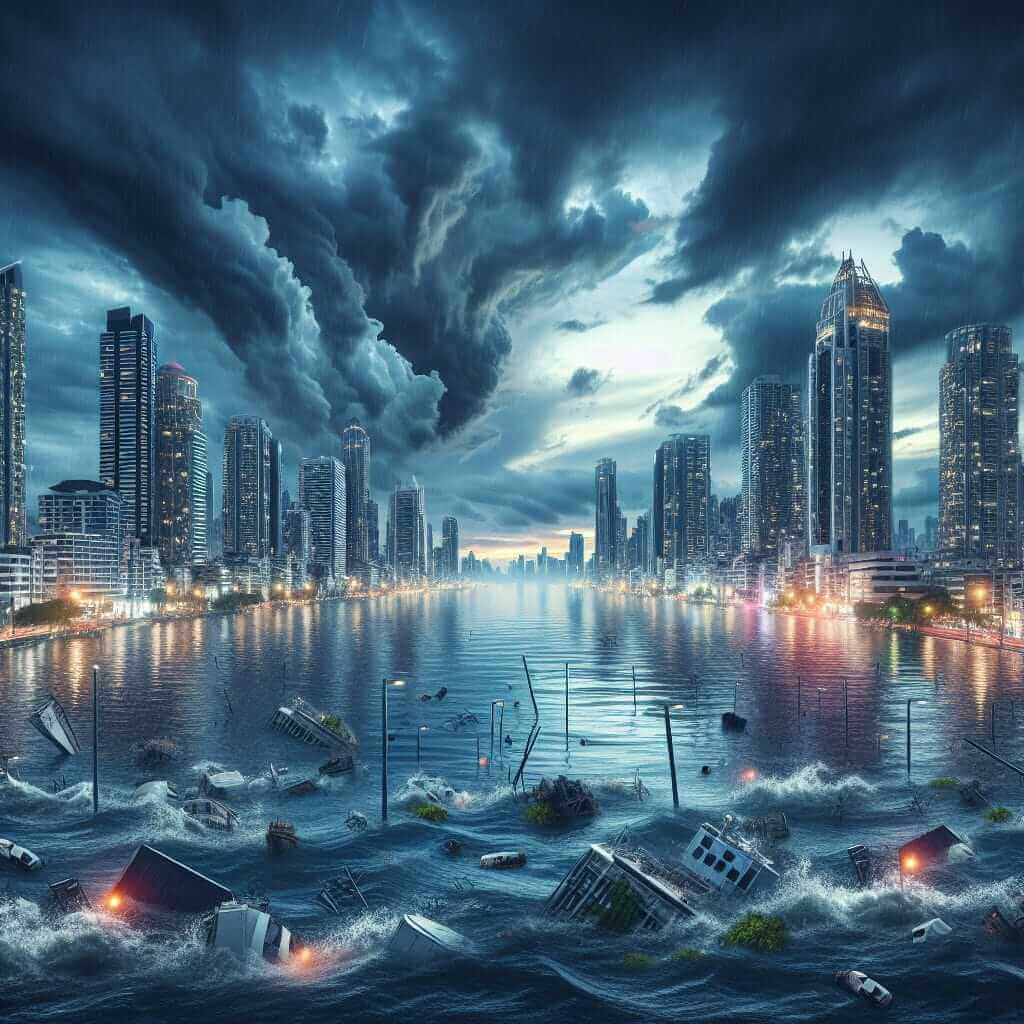The IELTS Reading section assesses a candidate’s ability to understand and interpret written texts. Topics are wide-ranging, reflecting real-world scenarios and contemporary issues. One such pertinent issue that has been addressed in several past tests is global warming, particularly its economic impacts on coastal cities. Given the escalating concerns about climate change, it is likely that future IELTS reading materials might touch on similar topics.
In this article, we’ll delve deep into the economic impacts of global warming on coastal cities. You’ll find an IELTS Reading practice test complete with questions and answers, extensive vocabulary, grammatical structures, and crucial tips to improve your reading score.
Reading Passage
The Economic Impacts of Global Warming on Coastal Cities
Recent studies indicate that global warming poses severe economic threats to coastal cities. Rising sea levels, more frequent and intense storms, and coastal erosion are primary contributors to these adversities. This reading passage explores these impacts in detail.
Coastal cities have historically been the hubs of commerce, tourism, and innovation. However, the economic resilience of these cities is severely jeopardized by the detrimental effects of global warming. As sea levels rise, coastal properties come under direct threat. According to NOAA, global sea levels have risen by approximately 8 inches since 1880, with the rate significantly accelerating over recent decades.

The increasing frequency and severity of storms due to global warming exacerbate these issues. For instance, Hurricane Katrina in 2005 caused unprecedented damage to New Orleans, with economic losses estimated at over $125 billion. Such natural disasters not only destroy infrastructure but also disrupt local economies and the livelihoods of millions.
Additionally, coastal erosion poses a continual threat. As protective beaches and dunes erode, properties and infrastructure become more vulnerable. The US Geological Survey estimates that beaches in parts of California and Hawaii are eroding at an average rate of 0.5 to 1.0 meter per year. This erosion significantly impacts the tourism industry, diminishing the attractiveness of these destinations.
Moreover, global warming also indirectly affects coastal cities by altering marine ecosystems. The warming ocean temperatures lead to the bleaching of coral reefs, essential for the fishing and tourism industries. The economic repercussions are widespread, affecting not just local communities but also global supply chains and trade.
Adapting to these changes requires substantial investment in protective infrastructure and sustainable practices. For instance, the Netherlands has invested billions in advanced sea walls and flood management systems. Similarly, investing in renewable energy sources also addresses the root cause of global warming and fosters economic resilience.
Questions
Questions 1-5: True/False/Not Given
- Coastal cities have never faced economic threats from natural disasters.
- The global sea level rise has been consistent since 1880.
- Hurricanes have no significant impact on the local economy.
- Coastal erosion affects the aesthetic appeal of tourism destinations.
- The Netherlands has completely avoided investment in renewable energy.
Questions 6-10: Matching Information
Match the following economic impacts with their corresponding causes:
- Direct threat to coastal properties
- Disruption of local economies
- Impact on the tourism industry
- Bleaching of coral reefs
- Requirement for substantial investment
A. Rising sea levels
B. Intense storms
C. Coastal erosion
D. Warming ocean temperatures
E. Adaptation to changes
Answer Key
- False – Coastal cities have faced economic threats from natural disasters such as storms and hurricanes.
- Not Given – The passage does not specify if the rise has been consistent.
- False – Hurricanes like Katrina have had significant impacts on local economies.
- True – Coastal erosion diminishes the attractiveness of tourism destinations.
- False – The Netherlands has invested in renewable energy.
Matching Information:
- A – Direct threat to coastal properties is caused by rising sea levels.
- B – Disruption of local economies is due to intense storms.
- C – Impact on tourism industry is due to coastal erosion.
- D – Bleaching of coral reefs is caused by warming ocean temperatures.
- E – Requirement for substantial investment is for adaptation to changes.
Common Mistakes to Avoid
- Misinterpreting Questions: Always go back to the text to verify answers.
- Overlooking Keywords: Spotting keywords in questions helps in locating the answers quickly.
- Time Mismanagement: Allocate equal time to each section; don’t get stuck on one question.
Vocabulary
- Commerce (noun): The activity of buying and selling, especially on a large scale.
Pronunciation: /ˈkɒmɜːrs/
Example: Coastal cities thrive on commerce due to their strategic locations. - Resilience (noun): The capacity to recover quickly from difficulties.
Pronunciation: /rɪˈzɪl.jəns/
Example: Effective policies can enhance the resilience of coastal cities.
Grammar Focus
- Relative Clauses:
- Structure: [Subject] + [Relative Pronoun] + [Verb]
- Example: The damages caused by Hurricane Katrina, which disrupted the local economy, were unprecedented.
Tips for High Reading Scores
- Practice Regularly: Consistent practice enhances comprehension speed and accuracy.
- Use Official Materials: Stick to IELTS official preparation books and reliable sources.
- Develop Scanning Skills: Learn to quickly locate significant information.
- Understand Question Types: Familiarity with various question types can save precious time during the exam.